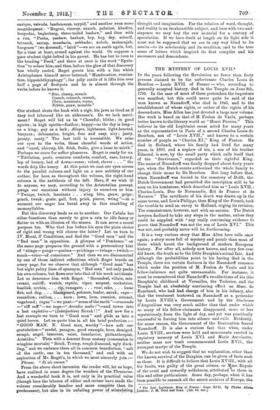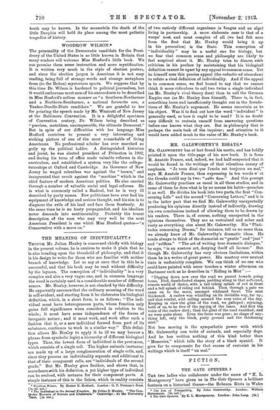THE MYSTERY OF LOUIS XVII.*
IN the yeara following the Revolution no fewer than forty persons *claimed to be the unfortunate Charles Louis de Bourbon -Louis XVII. of France — who, according to generally accepted history, died in the Temple on June 8th, 1795'. In the' case of most of these pretenders the imposture was manifest, but this could never quite be said of the man known as Naundorff, who died in 1845, and to the establishment of whose rights, or rather of the rights of his descendants, Miss Allen has just devoted a large new volume. Her work is based on that of M. Foulon de Vaulx, perhaps better known to the literary world as "Henri Proving." This believer in the old Legitimist cause acted for many years as the representative in Paris of a second Charles Louis de Bourbon, son of " Louis XVII.," and known to a certain number of people as "Charles XI.," King of France. He died in Holland, where his family had lived for many years, in 1899, and a nephew of his, a son of his brother Edmond, is now, by the small party which calls itself that of the " Survivance," regarded as their rightful King. The name of Naundorff was finally dropped about forty years ago, when the Dutch courts authorized the whole family to change their. name to De Bourbon. But long before that, when Naundorff was buried in the cemetery of Delft, the Dutch Government had permitted the inscription still to be seen on his tombstone, which described him as " Louis XVII.: Charles-Louis, Due de Normandie, Roi de France at de Navarre." The certificate of his death was drawn up in the sane terms, and Louis Philippe, then King of the French, took the trouble to send an envoy to Holland, urging its revision. The remonstrance, however, met with no success. The Dutch lawyers declined to take any steps in the matter, unless they could be supplied with "any really convincing evidence to prove that Naundorff was not the son of Louis XVI." This was not, and probably never will be, forthcoming.
It is a very curious story that Miss Allen here tells once again ; a story more full of mystery and puzzle than most of those which haunt the background of modern European history. For after all, nobody now knows, and very few ever did know, the truth as to the little Dauphin's actual fate. &nd although the probabilities point to his having died in the Temple, there are certain features in the Naundorff romance which make the position of M. Foulon de Vaulx and his fellow-believers not quite unreasonable. For instance, it must be remembered that Naundorff's recollections of his (the Dauphin's) childhood at Versailles, the Tuileries, and the Temple had an absolutely convincing effect on Mme. de Rainbaud, who had- had charge of him in his infancy, also tbait 'the treatment bestowed on Naundorff as a pretender by Louis XVIII.'s Government and by the Duchesse d'Angouleme was very much milder than that under which so many of his fellow-claimants disappeared, more or less mysteriously, from the light of day, and yet was practically successful in forcing him into silence and exile. Evidently, for some reason, the Government of the Restoration feared Naundorff. It is also a curious fact that when, under Louis XVIII., services were held and monuments erected in expiatory memory of Louis XVI. and Marie Antoinette, neither mass nor tomb commemorated Louis XVII., the youngest martyr of the Temple.
We do not wish to suggest that no explanation, other than the known survival of the Dauphin, can be given of facts snob as these. It is diffictat to believe that Louis XVIII., with all his faults, was guilty of the great crimes, or Mine. Royale of the cruel and cowardly selfishness, attributed to them in this and other publications. Some day, perhaps, when it has been possible to ransack all the secret archives of Europe, the
77,e Last- .rojitisuite Kist of Fromm : low)s %TM Pbcebe Allen" London: J. M. Dent and Son% [lax. net.I truth may be known. In the meanwhile the death of, the little Dauphin will hold its place among, the most pathetic tragedies of history.



























































 Previous page
Previous page